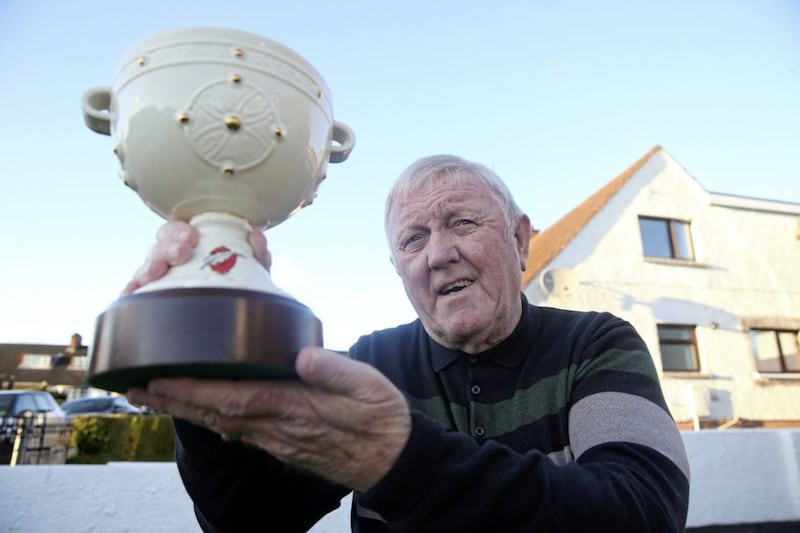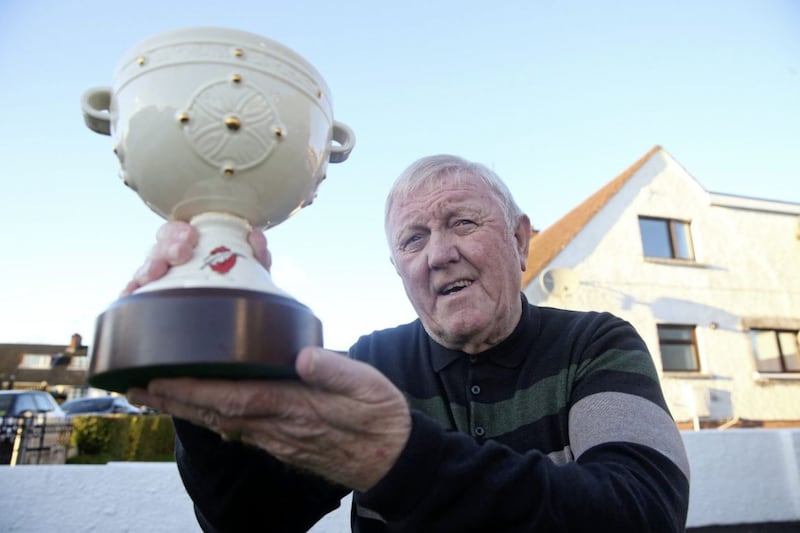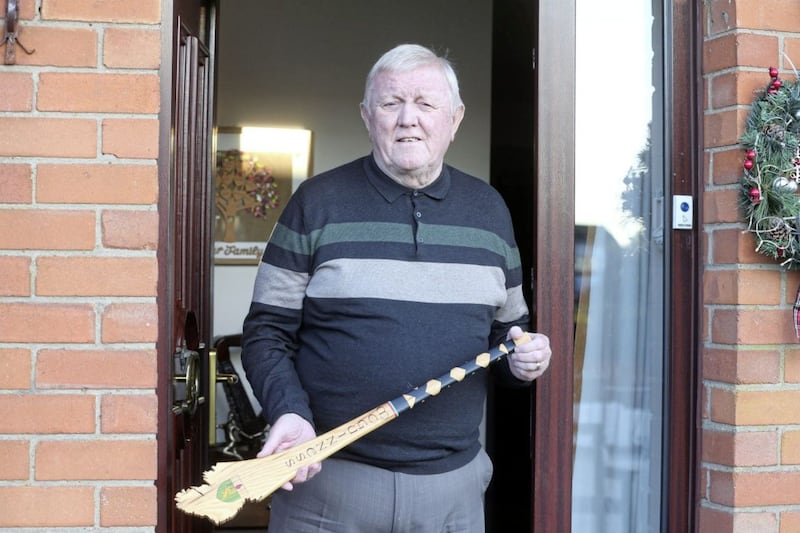'I'm a hurling man, I'm here for hurling'. All I wanted was my petrol money. The only other person I knew like that was Jim Nelson. They said they'd pay my phone bill too.
'That's all I ever took off Down.'
What he brought to them was priceless, where he took them was incredible.
Sean McGuinness cried when his county, Antrim reached the 1989 All-Ireland Senior Hurling Final. Even though he'd left as manager less than three years earlier over a point of principle, he was delighted for so many players he'd worked with for three seasons:
"When Antrim beat Offaly I stood and the tears were running down my cheeks, I was so pleased for them."
Within three years he'd be back at Croke Park, leading his team out in an All-Ireland semi-final. The amazing thing was that that team was Down.
The Ardsmen had been in the 1989 Ulster SHC Final, but it was the county's first such appearance since 1941, indeed the first final played since 1946, such was Antrim's utter dominance of the Ulster hurling scene.
And Antrim had won comfortably, by 2-16 to 0-9.
So it wasn't just the Belfast in him that prompted an incredulous reaction when McGuinness was invited to take on the Down job:
"James Keenan, the Down Hurling Board secretary, got in touch with me. A super man. Donal McCormack, the chairman, Brian McAvoy, the secretary, were there, Joe McCrickard of Liatroim was the hurling board chairman, the whole hurling board executive was there too.
'We want you to win an Ulster', they said.
"Tell us this," I replied, "is that all you're looking? Not an All-Ireland? You're only out of Division Three. You'll not win an Ulster until you're in Division One and playing at the top level.'
"They offered it to me for three years. I took it for one – I said 'At the end of it you'll know and I'll know whether I should still be here.'"
He stayed for six seasons, winning two Ulsters, but the journey was tough.
Two out of three ain't enough
Back up in Division Two – with Antrim in an eight-team Division One – McGuinness soon discovered the size of the task on his hands.
"The first match was Meath, in mid-October, one of the games I'd targeted [to win]. The week of the game we trained on the Tuesday but there were no Portaferry men there as they were in the Ulster Club. The Portaferry selector, a decent fella, told me they had changed their minds [about playing for Down at that stage].
"We were rapping doors for two nights, just to fill out a team. Then the Portaferry boys said they would play. I said 'No, they'll be subs'.
"I told everybody to be there at Ballygalget around two [o'clock] – there was one Portaferry man there.
"You either walk across the pitch or you have to walk right round to the dressing rooms.
"At ten to three the rest of the Portaferry men arrived and started to get stripped. I stopped the team talk and said 'What are yous doing? Get your clothes on and get out.
"And see if you don't turn up at training on Tuesday night - Donal, give every one of them a six-month suspension.
"Donal went white and they all walked out. They had to walk back across the pitch, so everybody in Down hurling saw them and knew what was going on. That was my start.
"Donal McCormack said to me 'Sean, I can't suspend them'; I said 'I know, but they don't know that'.
"We were eight points in front of Meath with six minutes to go – and they scored three goals to beat us [by 3-9 to 1-13]. I felt like driving into Strangford Lough on the way home. That was my first experience."
Let's get this party stopped
An early away game, against Offaly in Birr, presented another challenge: "I'd heard about the antics of the team when they were away. I had to stop all that.
"About half eight the night before we had a team meeting in the hotel close to the pitch. I told them they could go, have one pint, and be back by half ten.
"I went to bed at a quarter to three. And there were five [players] in the hotel.
"One of them was Noel Keith, who always went to bed and watched 'Match of the Day', happy as Larry. I couldn't name the other four.
"I came down to breakfast and never said a word. Before the match I said 'Go out and enjoy yourselves'. They got slaughtered. Couldn't lift a leg.
"The following Tuesday night, I was taking the training – the only thing I didn't do was cuts, someone else patched them up. We'd done about an hour and a half.
"I made the players stand in a semi-circle, drew a line with a hurl, and went round them one by one, their heads dropping. 'You can't look me in the eye and you think you're going to play county hurling?' I really laid into them.
"I knew who the five who'd come back to the hotel were but I looked at them all in turn and said: 'You either do it my way or your way. Make up your mind. If you're doing it your way, I'm away home.'
"They all said 'sorry, Sean'. It was the best thing that ever happened. There wasn't one of them stepped over that line to say 'I'm not staying'.
"They didn't know any better. They weren't used to it. After that, we didn't have any bother."
The concept of collective responsibility he'd promoted as an instructor at the Belfast boys' home for young offenders had worked again.
Years later, that culture change was recalled: "We had a match for a cancer charity when the Down and Antrim teams of the 90s played each other and [full-back] Gerard Coulter said to my wife afterwards: 'Eileen, he took the wheels off our party bus'. He used to lead them in the singing about three in the morning."
Relations and rivals
Sean McGuinness gave Down real reason to celebrate, especially in 1992, but the road to Ulster glory was never easy.
Picking largely from just three clubs - Ballycran, Ballygalget, and Portaferry – was one limiting factor, and occasionally led to unexpected restrictions, as McGuinness recalls:
"I got a phone call one night 'Sean, don't bother coming to training.'
"'Why? What's happened?'
"'Granny Coulter died.' There were 14 grandsons on the panel of 27. Out of those 27, only one that wasn't related to the others, that was Noel Sands. All the rest had cousins and second cousins.
"Somebody said to me 'Be careful of what you say because you don't know who you're offending'. We went sailing along, a happy squad."
Well, mostly. Relatives aren't always friends, especially with club rivalries in the mix:
"The first year there was nobody talking to one or other. You wouldn't have believed the dressing room. Ballycran, Ballygalget, Portaferry, each along one wall – and me on the other side. But we got there eventually.
"They were smashing days. The six years that I had with Down were unbelievable."
His humour helped. Among the anecdotes he reeled off, McGuinness remembers one time goalkeeper Noel Keith missed training:
"Him and John McCarthy used to arrive at training together but one Tuesday Noel wasn't there. McCarthy told me he was finishing off the wee girl's dolls' house, painting the rooms – 'but he told me to tell you he had the cold'.
"The next week I waited until everybody was there and said 'Noel, there's a terrible smell of thinners off you…'. He looked round and said 'McCarthy, you're a big c…!'"
A perceived common enemy also boosted team bonding. Hurling was a distant second best to football in Down, especially after the Mournemen ended Ulster's long wait to lift the 'Sam Maguire' again in 1991.
"The boys would have been complaining, 'They never gave us anything'. Donal [McCormack] told me 'There's boots and tracksuits sitting here, they wouldn't ask, the people on the Ards.'
"So I went to the boys and said 'If you can stay up in Division Two I'll get you tracksuits'. Then I talked about boots and 'Sandsy' wanted Puma Kings - so I got them all Puma Kings.
"There was always a bit of animosity between the county board and the people in the Ards, but that broke everything down."
The glory of 1992
Down did stay up in Division Two that season, 1989-90, then went up the next year, finishing second behind Galway, with Antrim back in fifth; third-placed Offaly went on to win the National League.
Up into a new six-team Division 1A, along with the 1991 All-Ireland Finalists Tipperary and Kilkenny, plus Offaly, Limerick, and Laois, McGuinness is rightly proud of what Down did in the League: "We stayed in Division One for three years, really picking out of three clubs."
Still, finishing fourth in 1A, above the two teams they beat, Offaly (away) and Laois, isn't why Down hurling people remember 1992.
With considerable understatement, McGuinness acknowledges: "1992 was a good year all right, winning the Ulster. It was a wee bit special…
"Before the match I named the three men who had sort of carried the three clubs for years – and two of them were dead. I said 'I want you to make sure you win this'. They were buzzing to get out.
"An Antrim official, who I don't want to name, stood in front and put his arms out, and said 'You're not going out for two minutes'.
"I said 'Are you letting him stop yous?! Run over him.' So they did.
"It was a great thing for Down."
The Antrim-Down rivalry was ratcheted up when McGuinness went to the Ards, especially with certain Saffron officials after he'd left the Antrim job in 1986: "The bitterness was there – and when I went to Down it made it worse, it definitely did. You have no idea."
Sean McGuinness had brought belief, and maintained it despite defeats in the 1990 and 1991 Ulster Finals, by six and then four points.
Down were getting closer, even if some in Antrim didn't think so: "The year before, both teams were in the Balmoral [Hotel] and one of the Antrim players, a very good friend of mine, said 'Sean, you didn't think that you could beat us?'
"Here's me: 'We'll get yous next year'. He laughed it off, but I wasn't going to agree with him."
Down did 'get' Antrim, and then some, thrashing them in a double scores defeat, 2-16 to 0-11:
"We ran the shorts off them for a start. We knew what their weaknesses were, and what our strengths were.
"That was [Gerard] McGrattan's year. He was brilliant – but he wasn't on his own. Danny Hughes, Marty Mallon, our full-back line.
"If someone had said to me 'Pick the best team in Ireland' I'd have picked the three Down full-backs. Then Noel Keith in behind them. Wee 'Sandsy' was the captain and him and Seamus McMullan cut lumps out of other.
"The Antrim boys were very gracious about it. First player over to me after the final whistle was Paul McKillen, congratulating me."
A mindless minority of Saffron 'supporters' weren't so phlegmatic, resorting to phlegm rather than praise for the victorious Down manager:
"I only lived about five minutes in the car from Casement. I'd to walk the roads and the abuse I got from some people wasn't ordinary.
"See when I came in that day [the '92 Ulster Final], I'll never forget it, my coat was covered in spittle. People spitting on me, hanging from the stand. That got to me. But anyone like that wasn't genuine Antrim supporters."
Down to Croke
There were only slightly over 31,000 people in Croke Park on August 9, 1992, for a double-header of All-Ireland hurling semi-finals, but it's not much of an exaggeration when McGuinness says "I think everybody in the Ards was at that match.
"On the way, we went through a lot of the villages in Down on the bus and they were all decorated. It was a huge thing for those players. Getting the escort in on the morning of the match, that was special – we thought only the President [of Ireland] got that.
"I had to say to a couple of officials, 'Don't let the boys see you' – they were actually crying going into the match. It meant so much to them."
Again Cork were the opponents, as they had been against his Antrim team in 1986, and again a Sean McGuinness side made the Rebels sweat, before they emerged victors by 2-17 to 1-11:
"We scored a goal and it left two points in it. Ger Cunningham took a ball out of his pocket, pucked it out, our boys were advanced in attack, were caught out and they scored a goal. That just knocked the momentum."
Down didn't stop, though.
Another highpoint was retaining Division One status in 1993. Having beaten Offaly and Antrim, but lost narrowly to Tipperary and Limerick, Down faced a massive challenge in their remaining game:
"We really worked hard. Our last match, we had to play Kilkenny in Kilkenny. The winners went into a play-off, the losers got relegated.
"We crossed the ball and stuck it in the net late on - but it was given as a 'square ball' and they went straight down the pitch and scored a goal.
"We were four points down with five minutes to go – and we scored five points and beat Kilkenny. The only time Down has played Kilkenny in senior.
"We started to warm up Paddy Dorrian, our reserve full back, and Ger Coulter thought he was being taken off. I shouted 'Centre three-quarters' and, as he was running up the pitch, their keeper pucked it out, Ger caught it, and put it over the bar. Everybody was saying 'That was some move!'
"That was level. Then 'the Hunter' [Chris Mageean] caught the ball and put it over the bar to win it.
"What a day that was. I think they had 13 of the team that had won the All-Ireland [in 1992, and went on to retain it].
"We stayed in Division One for three years, really picking out of three clubs."
An incident in the immediate aftermath of that famous victory at Nowlan Park summed up the attitude Sean McGuinness instilled in Down hurling:
"I'll always remember wee Jim Keenan going to shake hands with big Ollie Walsh, who was over Kilkenny - and Ollie walked on.
"'What's wrong with you, can you not take a beating?!', Jim asked.
"I said 'Jim, he'll throw you over the f---ing wire!'"
With big Sean McGuinness in charge, Down hurling feared no one.







